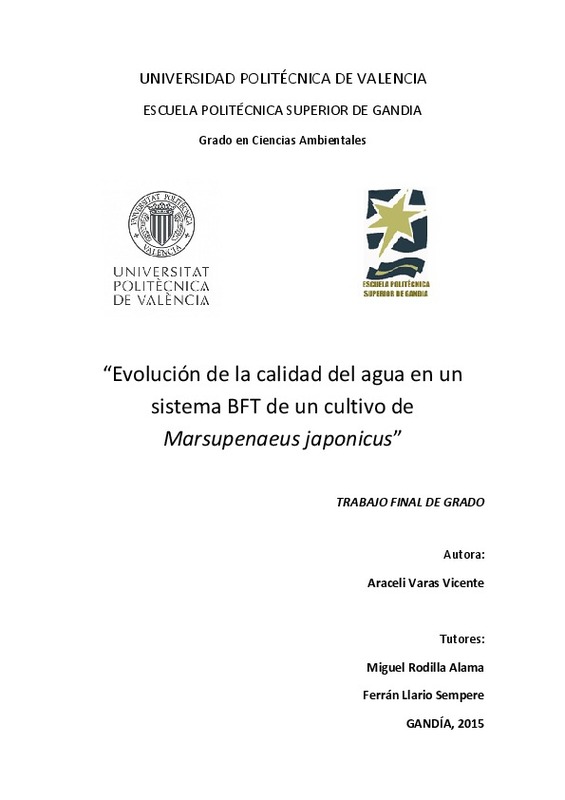|
Resumen:
|
En los últimos años se han desarrollado nuevas tecnologías acuícolas que pretenden
reducir, e incluso evitar, el recambio de agua durante grandes periodos de tiempo, uno
de estos son los sistemas de bioflóculos (BFT). ...[+]
En los últimos años se han desarrollado nuevas tecnologías acuícolas que pretenden
reducir, e incluso evitar, el recambio de agua durante grandes periodos de tiempo, uno
de estos son los sistemas de bioflóculos (BFT). En estos sistemas se permite aumentar
la densidad de cultivo y reducir la renovación de agua, consiguiendo un bajo impacto
ambiental.
En este trabajo se ha estudiado la evolución de la calidad del agua de un sistema BFT
comparándolo con uno convencional con recirculación y depuración del agua,
utilizando para el cultivo de camarones la especie Marsupenaeus japonicus. Para ello
se han realizado dos experimentos, uno a menor temperatura y otro complementario
a mayor temperatura, para lo cual se ha medido varias veces a la semana la salinidad,
temperatura, pH, oxígeno disuelto, amonio, nitrito, nitrato, fosfato, sólidos
suspendidos y sedimentables, y se ha controlado el crecimiento de los camarones cada
quince días.
Con los datos obtenidos se observan diferencias estadísticas entre los tratamientos,
estableciendo también relaciones entre ellos y el efecto que tienen en los sistemas de
producción de Marsupenaeus japonicus. Se observó que los sistemas BFT tuvieron más
supervivencia y biomasa al finalizar el experimento que el sistema convencional.
[-]
In the last few years there have been new aquaculture technologies that pretend
reduce or even avoid, the replacement of water for long periods of time, one of these
systems are biofloc technology (BFT). In these systems ...[+]
In the last few years there have been new aquaculture technologies that pretend
reduce or even avoid, the replacement of water for long periods of time, one of these
systems are biofloc technology (BFT). In these systems it is possible to increase crop
density and reduce water renewal, achieving a low environmental impact.
In this work has studied the evolution of the water quality of a BFT system compared
to a conventional system with recirculation and purifying water, using Marsupenaeus
japonicus species for the shrimp farming. To carry out this work, there have been two
experiments, one cooler and other complementary higher temperature, for which it
has been measured several times a week salinity, temperature, pH, dissolved oxygen,
ammonium, nitrite, nitrate, phosphate, suspended and settleable solids, and
controlled the growth of shrimp every fortnight.
With the data obtained statistical differences between treatments are observed, also
establishing relationships between them and the effect they have on production
systems of Marsupenaeus japonicus. It was observed that BFT systems had more
survival and biomass at the end of the experiment than the conventional system.
[-]
|







